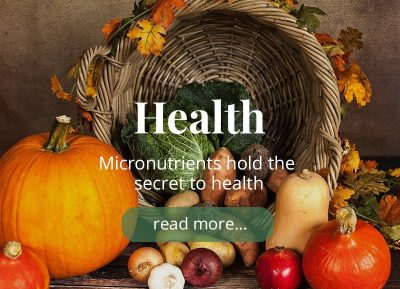Health

The body is built to pull out what it needs from the available foods. Don’t overthink, simply get a diverse diet. The body (not the mind) chooses what to accept and what to reject.
Dietary diversity is essential. The range of nutrients needed for superior health and disease prevention come from a variety of sources. Both vitamins and minerals are well acknowledged as nutritional essentials.
The macronutrients, carbohydrates, proteins, and fats are the foundation of a healthy diet. These foods make up the greatest volume of foods we eat but they are useless without the vitamins and minerals contained within them. These are the micronutrients.
Vitamins are organic compounds that are produced mostly by plants and bacteria. The vitamins your body cannot manufacture in sufficient amounts are called “essential micronutrients”. Except for vitamin D and B12 they all must be derived from the foods we eat. We do not manufacture them.[1]
Minerals are absorbed by plants from soil or water. They are inorganic elements and must be taken in either by eating plants or in some cases, animals that have eaten plants. The requirement for specific minerals varies widely. Those minerals that have lower requirements (but still essential) are called trace minerals.
All the micronutrients are only required in small amounts, but if we do not have the full range it puts the body in danger of disease. The reality of this has created a general concern for the issue of “insufficiency” or “deficiencies” regarding these tiny potent substances.
Vitamin and mineral deficiencies are seen as the cause of Scurvy, Rickets, Beriberi, and Anaemia as well as a long list of other diseases. These diseases are normally associated with poverty and malnutrition. In other words, they are simply caused by a lack of food. They are rare in affluent countries since the diet may be unhealthy, but it is diverse. This has not stopped the promotion of supplements touting preventative benefits or food manufacturers “fortifying” with “essential” vitamins or minerals.
While the common deficiency diseases are rare in Western society, a diet without adequate micronutrients can still cause problems. A lack of minimal vitamins or minerals can be a contributing factor to a variety of major illnesses such as type 2 diabetes, cancer, heart disease, and osteoporosis.
Micronutrients play an essential role in immune functions[2], the management of Alzheimer’s disease[3], and metabolism[4]. These vitamins and minerals also act as antioxidants. They help reduce the activity of free radicals which cause premature ageing and exacerbate inflammation. Free radicals are linked to the cell damage that is associated with cancer development [5]. The most important source of antioxidants are fruits, vegetables, and grains.
When it is discovered that there is any nutrient that has great value business moves in with the message that you might not have enough. Vitamin deficiency was a primary scare tactic in the 1950’s to promote foods that have been “fortified” or “enriched” with extra nutrients. Bread, milk, fruit juice, and breakfast cereals all need extra help to be healthy. This sales strategy is still in force.
The idea that there may be serious deficiencies in our diet is a powerful message. This is particularly true when choosing food for children. What parent would not want their child to drink orange juice if it meant they would avoid scurvy? If added iron in the bread, or 5 added vitamins and 2 added minerals in their breakfast cereal is good for them, so be it. These common nutritional narratives live on in the consumer consciousness long after they have been shown to be empty promises.
According to the experts at Johns Hopkins University, half of all American adults take multivitamins or other vitamin supplements on a regular basis. The cost is $12 billion a year. In a study of 450,000 people, they found that the vitamins did not reduce the incidence of heart disease, cancer, cognitive decline, or early death.[6] This same conclusion has been reached by multiple researchers. They all say It would be better spent on whole foods.
"I'm puzzled why the public in general ignores the results of well-done trials," said Eric Klein, national study coordinator for the prostate cancer trial and chairman of the Cleveland Clinic's Glickman Urological and Kidney Institute. "The public's belief in the benefits of vitamins and nutrients is not supported by the available scientific data."[7]
The reality of vitamin and mineral requirements is that they have been driven by the food industry and not science. Because of this they do not reflect several simple facts that are well known by serious nutritional researchers.
What We Can Do
- Cooking is really important when eating grains, beans and many vegetables. Make sure you have enough vegetables in your diet. The food we digest needs to make it through the gut biome before it can make any impact on our energy and maintenance needs.
- The body is built to pull out what it needs from the available foods. Don’t overthink, simply get a diverse diet. The body (not the mind) chooses what to accept and what to reject. In the words of Professor T. Colin Campbell, “The body reigns supreme in choosing which nutrients it uses and which it discards unmetabolized.”[8]
- All micronutrients work in concert with others, usually in pairs. The proper balance of these complimentary pairings cannot be worked out in the lab. it is the microorganisms in the gut biome that “decide” which nutrients to allow in and which to reject.[9] This distinction is made according to what an individual needs, not what they think they want. This is why a simple, unprocessed, un-fortified, diet is the healthiest.
- Download our free eBook, The Human Ecology Diet for ideas on creating a diverse healthy diet. https://humanecologyproject.com/what-to-eat/
[1] [1] https://www.health.harvard.edu/staying-healthy/micronutrients-have-major-impact-on-health#:~:text=Five%20micronutrients—
[2] https://pubmed.ncbi.nlm.nih.gov/17726308/
[3] https://www.ncbi.nlm.nih.gov/pmc/articles/PMC3656646/
[4] https://pubmed.ncbi.nlm.nih.gov/16376462/
[5] https://www.cancer.gov/about-cancer/causes-prevention/risk/diet/antioxidants-fact-sheet
[6] https://www.hopkinsmedicine.org/health/wellness-and-prevention/is-there-really-any-benefit-to-multivitamins
[7] https://www.nytimes.com/2009/02/17/health/17iht-vitamin.1.20240783.html
[8] Whole, rethinking the science of nutrition, T. Colin Campbell, PhD with Howard Jacobson PhD, BenBella Books
[9] https://www.bmj.com/content/361/bmj.k2179

